 W
WAge of Ambition: Chasing Fortune, Truth, and Faith in the New China is a non-fiction book by Evan Osnos, a staff writer at The New Yorker. Age of Ambition chronicles the lives of people that Osnos came to know while he was in China from 2005 to 2013.
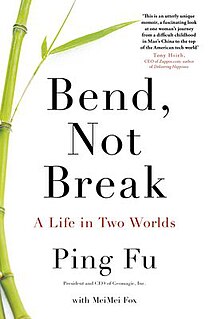 W
WBend, Not Break: A Life in Two Worlds is a 2012 memoir by Ping Fu, with co-author MeiMei Fox. The book tells stories from Fu's life, starting with her childhood in China at the dawn of the Cultural Revolution, and continuing through her role as co-founder and CEO of Geomagic, a 3D graphics software development company in the United States. The book was first published in English on December 31, 2012 through Portfolio Hardcover.
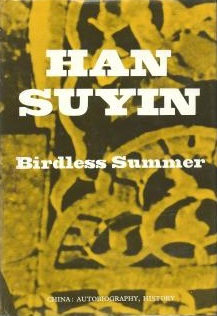 W
WBirdless Summer is an autobiography by Han Suyin. It covers the years 1938 to 1948, her work as a midwife in Chengtu and then going to London with her husband, who was a military attaché there. Also her training as a doctor, the start of the last phase of the Chinese Civil War, in which her husband died fighting for the Kuomintang.
 W
WChina Illustrata is the 1667 published book written by the Jesuit Athanasius Kircher (1602–1680) that compiles the 17th century European knowledge on the Chinese Empire and its neighboring countries. The original Latin title was: ”Athanasii Kircheri e Soc. Jesu China monumentis, qua sacris qua profanis, nec non variis Naturae et artis spectaculis, aliarumque rerum memorabilium argumentis illustrata, auspiciis Leopoldi primi, Roman. Imper. Semper augusti Munificentissimi Mecaenatis“.
 W
WChina’s Spiritual Need and Claims is a book written by James Hudson Taylor, the founder of the China Inland Mission, in October 1865. It is arguably the most significant work regarding Christian missions to China in the 19th century. A manifesto of Taylor’s life and work, it describes in stark detail the desperate lack of Protestant Christian missionary endeavor among the people of China. The book was reprinted several times over thirty years and motivated uncounted numbers of Christians in Europe, North America, Australia, and New Zealand to volunteer for service in east Asia. China’s Spiritual Need and Claims helped foster the widest evangelistic campaign since the time of Paul the Apostle. Charles Spurgeon noted in 1879:The word China, China, China is now ringing in our ears in that special, peculiar, musical, forcible, unique way in which Mr. Taylor utters it.
 W
WThe Chinese Language: Fact and Fantasy is a book written by John DeFrancis, published in 1984 by University of Hawaii Press. The book describes some of the concepts underlying the Chinese language and writing system, and gives the author's position on a number of ideas about the language.
 W
WChinese Shadows is a book written by Simon Leys, which is the pseudonym for Belgian Sinologist Pierre Ryckmans. It was originally published in the French language in 1974 under the title Ombres chinoises, and was then translated into English in 1977. The book is about Leys' six-month stay in China, which he made in 1972. Leys discusses the cultural and political destruction of the People's Republic of China by Mao Zedong, who was the chairman of the Communist Party of China at the time. He wrote under a pseudonym since, like other academics and journalists who refrained from criticizing China, he did not want to be barred from future visits to Peking.
 W
WThe Christian Occupation of China: A General Survey of the Numerical Strength and Geographical Distribution of the Christian Forces in China, Made by the Special Committee on Survey and Occupation, China Continuation Committee, 1918-1921 is a book published in 1922 simultaneously in English and Chinese by the Special Committee on Survey and Occupation, commissioned by the China Continuation Committee, headed by Milton T. Stauffer, assisted by Tsinforn C. Wong, and M. Gardner Tewksbury. The volume was intended as a progress report on the status of Christian churches in China, including social and economic background and local conditions, in preparation for foreign missionaries to turn control over to Chinese Christians, but instead, partly because of the provocative title of the English version, was one of the provocations of anti-Christian movements of the early 1920s.
 W
WThe Coming China Wars: Where They Will Be Fought, How They Can Be Won is a book by Peter Navarro published by FT Press in (2006). Navarro examines China as an emerging world power confronting challenges at home and abroad as it struggles to exert itself in the global market. He also investigates how China's role in international commerce is creating conflicts with nations around the world over energy, natural resources, the environment, intellectual property, and other issues. A review in Publishers Weekly describes the book as "comprehensive" and "contemporary" and concludes that it "will teach readers to understand the dragon, just not how to vanquish it".
 W
WDe Christiana expeditione apud Sinas suscepta ab Societate Jesu ... is a book based on an Italian manuscript written by the most important founding figure of the Jesuit China mission, Matteo Ricci (1552–1610), expanded and translated into Latin by his colleague Nicolas Trigault (1577–1628). The book was first published in 1615 in Augsburg.
 W
WDeath by a Thousand Cuts is a book by the historians Timothy Brook and Gregory Blue and scientific researcher Jérôme Bourgon which examines the use of slow slicing or lingchi, a form of torture and capital punishment practised in mid- and late-Imperial China from the tenth century until its abolition in 1905.
 W
WDestruction and Sorrow Beneath the Heavens is a 2004 book by the Hungarian writer László Krasznahorkai. The narrator, László Stein, travels in China in search of examples of classical Chinese culture and understanding how contemporary Chinese society relates to it. An English translation by Ottilie Mulzet was published in 2016.
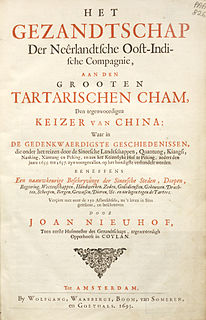 W
WAn embassy from the East-India Company of the United Provinces is a book written by Dutch author and explorer Johan Nieuhof. The full title of the English version of the book is An embassy from the East-India Company of the United Provinces, to the Grand Tartar Cham, emperor of China: delivered by their excellencies Peter de Goyer and Jacob de Keyzer, at his imperial city of Peking wherein the cities, towns, villages, ports, rivers, &c. in their passages from Canton to Peking are ingeniously described by John Nieuhoff; Englished and set forth with their several sculptures by John Ogilby. The book served as a major influence in the rise of chinoiserie in the early eighteenth century.
 W
WThe Record of a Pilgrimage to China in Search of the Law is a four-volume diary written by Ennin, a Japanese Buddhist monk in China during the ninth century. He was one of eight Japanese Buddhists who studied in China at that time. He wrote his diary while he went on a Buddhist pilgrimage to China for nine and a half years (838-847). The books are translated into English as two volumes by Professor Edwin O. Reischauer of Harvard University under the title Ennin's Diary: The Record of a Pilgrimage to China in Search of the Law and Ennin's Travels in T'ang China. The first volume is a translation of Ennin’s Diary. The second volume, a discussion of Ennin's travels, includes materials from other sources.
 W
WFlora Sinensis is one of the first European natural history books about China, published in Vienna in 1656. Its author, Michael Boym, was a Jesuit missionary from Poland.
 W
WThe Forbidden Game: Golf and the Chinese Dream is a non-fiction book by Dan Washburn, an American journalist who was based in Shanghai, China from 2002 to 2011. It was published by Oneworld Publications in 2014. In the book, Washburn uses the contradictory emergence of golf as a "metaphor for modern China." The Financial Times named The Forbidden Game one of the best books of 2014.
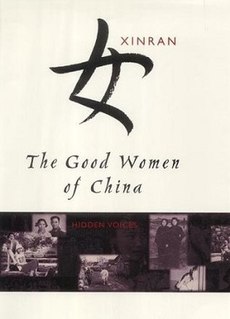 W
WThe Good Women of China (ISBN 0-701-17345-9) is a book published in 2002. The author, Xue Xinran, is a British-Chinese journalist who currently resides in London and writes for The Guardian. Esther Tyldesley translated this book from Chinese.
 W
WHungry Ghosts: Mao's Secret Famine is a book written by Jasper Becker, the Beijing bureau chief for the South China Morning Post. Becker argues that the American press reported the Great Chinese Famine with accuracy, but leftists and communist sympathisers such as Edgar Snow, Rewi Alley, and Anna Louise Strong, remained silent or played down its severity, when Mao Zedong's Great Leap Forward had turned into a horrible tragedy. Becker concludes that the tragedy could have been averted after the first year if Mao's senior advisers had dared to confront him.
 W
WJourney to the Forbidden China is a book by Steven W. Mosher, cultural anthropologist and sinologist. The book covers his anthropological work in the countryside of South China.
 W
WJourney to the West is a Chinese novel published in the 16th century during the Ming dynasty and attributed to Wu Cheng'en. It is one of the Four Great Classical Novels of Chinese literature. It has been described as arguably the most popular literary work in East Asia. Arthur Waley's popular abridged translation, Monkey, is well known in English-speaking countries.
 W
WA Leaf in the Storm, a Novel of War-Swept China is a novel written in English by Lin Yutang, published in 1941 by John Day Company. Set in Beiping (Beijing) when it was controlled by the Japanese, the novel describes the years of the Second Sino-Japanese War before the American entrance in 1941. It is a sequel to Lin's Moment in Peking.
 W
WLords of the Rim is a book written by American historian Sterling Seagrave. It was first published in 1995, then substantially updated in a second edition published in 2010. It is a history of Chinese expatriate economics written for the lay person and has received mainly positive reviews. Presenting an in-depth overview of the outstanding success of expatriate Chinese business people around the Pacific Rim, the author begins with a potted history of China's finance and business practices over the last three thousand years and the political reasons for the first tide of entrepreneurs to chance their luck overseas.
 W
WMei Li is a book by Thomas Handforth. Released by Doubleday, it was the recipient of the Caldecott Medal for illustration in 1939.
 W
WA Mortal Flower is an autobiography by Han Suyin. It covers the years 1928 to 1938: her growing up in China and her journey to Belgium and her mother's family. Also her marriage to a rising officer in the Kuomintang and the retreat to Chungking in the face of the Japanese invasion of China.
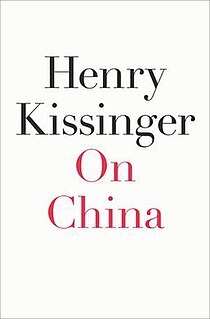 W
WOn China is a 2011 non-fiction book by Henry Kissinger, former United States Secretary of State. Kissinger, one of the most famous diplomats of the 20th century, is well known for the role he played in Sino-American relations during the Nixon administration, particularly the Nixon's 1972 visit to China.
 W
WThe Party: The Secret World of China's Communist Rulers is a book written by Richard McGregor, a former bureau chief of the Financial Times in China. It was published by Penguin Books on June 25, 2010. The traditional Chinese version 《中國共產黨不可說的秘密》 was published by Linking Publishing Company (聯經出版) in Taiwan, Republic of China on September 16, 2011.
 W
WPraying for Power: Buddhism and the Formation of Gentry Society in Late-Ming China is a history book which explores the relationship between Buddhism and Neo-Confucianism during the 17th and 18th centuries in China ; tourism to Chinese Buddhist sites, and the patronage of Buddhist monasteries in China by Buddhist and Neo-Confucian gentry during this period. This philanthropy allowed these patrons to "publicize [their] elite status outside the state realm" and promoted the growth of a society of gentry.
 W
WThe Prime Minister Was a Spy is a 1983 book by British writer Anthony Grey. The book's premise is that Harold Holt, Prime Minister of Australia from 1966 to 1967, was a lifelong spy for the Chinese government, under both the Nationalist and Communist regimes. Its most famous claim is that Holt faked his own death – rather than drowning, he boarded a Chinese submarine stationed off the Australian coast and lived the rest of his life in Beijing. The book was widely ridiculed upon its release, and has been identified as containing numerous factual errors.
 W
WRed China Blues: My Long March from Mao to Now is a 1996 book by Chinese-Canadian journalist Jan Wong. Wong describes how the youthful passion for left-wing and socialist politics drew her to participate in the Chinese Cultural Revolution. Speaking little Chinese, she became one of the first Westerners to enroll in Beijing University in 1972.
 W
WRed Star Over China, a 1937 book by Edgar Snow, is an account of the Communist Party of China that was written when it was a guerrilla army and still obscure to Westerners.
 W
WRiding the Iron Rooster (1988) is a travel book by Paul Theroux primarily about his travels through China in the 1980s. One of his aims is to disprove the Chinese maxim, "you can always fool a foreigner". It won the 1989 Thomas Cook Travel Book Award.
 W
WThe River at the Center of the World: A Journey Up the Yangtze, and Back in Chinese Time (ISBN 0-312-42337-3) is a book by Simon Winchester. It details his travels up the Yangtze river in China and was first published in 1996.
 W
WRiver Town: Two Years on the Yangtze is a 2001 book by Peter Hessler. It documents his Peace Corps teaching assignment at Fuling Teachers College in Fuling, Sichuan, which started in 1996 and lasted for two years; Fuling is now part of Chongqing municipality.
 W
WStilwell and the American Experience in China, 1911–45 is a work of history written by Barbara W. Tuchman and published in 1971 by Macmillan Publishers. It won the 1972 Pulitzer Prize for General Non-Fiction. The book was republished in 2001 by Grove Press It was also published under the title Sand Against the Wind: Stilwell and the American Experience in China, 1911–45 by Macmillan Publishers in 1970.
 W
WTao: On the Road and on the Run in Outlaw China written by Aya Goda and translated by Alison Watts, was first published in hardback in 2007, and in paperback in 2008. This travel memoir/biography recounts the journey she undertook crisscrossing China with the artist Cao Yong in 1989, in order to collect the necessary documents so she can help him flee to Japan. The original Japanese version was published by Bungei Shunju in 1995, and awarded 17th Kodansha Non-Fiction award in Japan.
 W
WThought Reform and the Psychology of Totalism: A Study of "Brainwashing" in China is a non-fiction book by psychiatrist Robert Jay Lifton on the psychology of mind control.
 W
WTraveling in Sin is a memoir by American authors Lisa Ellen Niver and George Rajna of We Said Go Travel that is written in the voices of the story's two leading protagonists who met on-line in January 2007.
 W
WUnbound: A True Story of War, Love, and Survival is a narrative nonfiction book by author Dean King. It follows the stories of the 30 women who undertook the Long March as part of the Chinese Red Army in 1934. While only 10,000 of the original 86,000 soldiers survived the 4,000 mile trek, all 30 women survived. To research the project, King interviewed the last surviving woman who marched with the First Army, and delved into historical accounts previously untranslated into English. As with his previous book, the nonfiction national bestseller Skeletons on the Zahara, he also traversed one of the most dangerous portions of the journey on foot, trekking in the Snowy Mountains and on the high-altitude bogs of western Sichuan Province. Unbound has been released in hardback, eBook, and audiobook.
 W
WWays That Are Dark: The Truth About China is a 1933 non-fiction book by Ralph Townsend which presents Townsend's observations on the state of then-contemporary China. The book is considered an anti-Chinese polemic.
 W
WWill the Boat Sink the Water?:The Life of China's Peasants, is a 2006 non-fiction book authored by husband and wife team Chen Guidi and Wu Chuntao. It is the English translation of Zhongguo Nongmin Diaocha, published in Chinese in 2004.